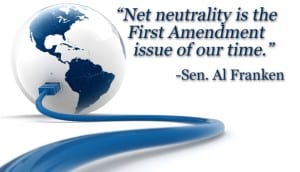 Following a controversial decision on Net Neutrality, FCC Commissioner Jessica Rosenworcel made a Seattle appearance last week to meet with area tech companies as well as the site of the tragic Oso slide.
Following a controversial decision on Net Neutrality, FCC Commissioner Jessica Rosenworcel made a Seattle appearance last week to meet with area tech companies as well as the site of the tragic Oso slide.
Ms. Rosenworcel, who has advocated for an open Internet, was actually critical of the proposal and attempted to delay it until the agency gathered public comment. But she ended up voting to proceed after some changes were made.
President Obama nominated the longtime communications lawyer to become one of the five FCC commissioners in 2012. She previously was senior communications counsel to the Senate Committee on Commerce, Science and Transportation, and before that was legal adviser to former FCC Commissioner Michael Copps.
Between visits with T-Mobile US, Microsoft and others, Rosenworcel, took the time to chat with Brier Dudley of the Seattle Times about some of the issues facing the FCC.
Dudley asked why she was in Seattle, and she responded, “The world’s gone wireless so wireless technology is one of the most exciting aspects of what we do. The wireless economy has a long history in Seattle – there’s a lot of spectrum expertise in these parts — so we’ve spent some time with that community, learning a little bit more about what they’re doing.
It’s a task for the agency to make sure we take the airwaves around us and zone them better and more efficiently so all of our devices have space to operate. You can learn about that in Washington [D.C.] but sometimes it’s good to come out and talk to people who are in the field.”
On the issue of the FCC’s Net neutrality proposal…
“I had called on our chairman to delay our rulemaking because I thought it was important to have more public input as we developed our rulemaking, so I concurred in the decision last week.
But here’s the good news: We have now put that rulemaking out to the public and I hope people comb through it – every last detail. And I hope in the time ahead we hear from the giants of the tech community, we hear from the big broadband providers, but most importantly we hear from the American public, because this is a big issue and we’re going to need to have input, far beyond the usual suspects.” (Here’s where to comment.)
FCC Commissioner Mignon Clyburn said last week: “You have the ear of the entire FCC. The eyes of the world are on all of us. Use your voice and this platform to continue to be heard.”
- A list of open proceedings is available on fcc.gov/comments.
- The net neutrality rulemaking is Proceeding No. 14-28 and is known as “Protecting and Promoting the Open Internet.”
- Click “14-28” and it will bring you to the FCC’s electronic filing system.
- Type in your name, address, comment, and hit continue. Note that submitted comments will be part of the public record and available online.
- That form supports comments of up to several paragraphs. If you have more to say, and want to include attachments, navigate to the “Submit a Filing” page, which supports more lengthy comments. Just make sure you include the 14-28 proceeding number. If your comments are more than 10 pages, the FCC recommends that you include a short summary up front.
- If you prefer to submit via mail or in person, you can mail your comments to FCC Secretary Marlene H. Dortch at 445 12th Street, SW Room TW-B204, Washington, DC 20554. Or, you can hand deliver them to 236 Massachusetts Ave., NE, Suite 110, Washington, DC 20002 between 8 a.m. and 7 p.m. ET.
The deadline for the first round of comments is July 15. A second round of reply comments – where you can address some of the issues people brought up in the first round – will run until Sept. 10.
People have not wasted any time submitting comments; hundreds have already been filed since yesterday. A number of filers appear to be using the form provided by the Electronic Frontier Foundation that expresses concern about a pay-to-play Internet.
Others are urging the FCC to reclassify broadband as a telecom service rather than an information service (also known as Title II or common carrier). This would give the FCC more authority over broadband providers than it has today, but it’s a highly contentious issue and likely faces a huge fight from ISPs if the commission goes in that direction. [24×7]





















